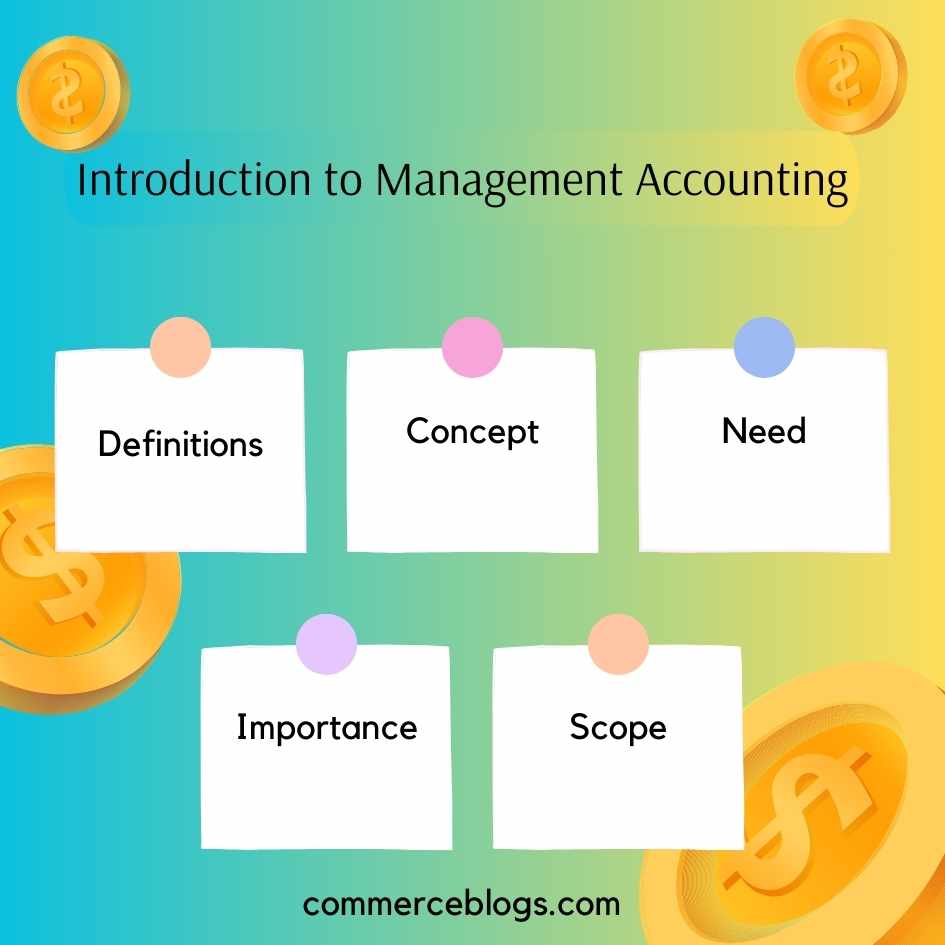Introduction to Introduction to Management Accounting
In this article we will go through the topic Introduction to Management Accounting. Management accounting is a vital branch of accounting that focuses on providing financial and non-financial information to managers within an organization.
Its primary purpose is to support decision-making, facilitate planning, and enhance control over organizational operations.
Concept of Management Accounting
Definitions
1. Management accounting involves the process of preparing management reports and accounts that provide accurate and timely financial and statistical information to managers for decision-making purposes.
2. Management accounting is the process of identifying, measuring, analyzing, interpreting, and communicating financial information to managers to assist them in making informed business decisions and achieving organizational goals.
3. Management accounting is the provision of financial and non-financial information that supports management in planning, controlling, and evaluating the operations of an organization, enabling them to make strategic decisions effectively.
Purpose
Its main goal is to assist management in planning, controlling, and making informed operational decisions.
Focus
Unlike financial accounting, which is historical and aimed at external stakeholders, management accounting is future-oriented and tailored to internal management needs.
The Need for Management Accounting
1. Support for Decision-Making
i) Informed Choices
Management accounting provides timely and relevant information that aids managers in making informed decisions.
ii) Scenario Analysis
By using techniques like cost-volume-profit analysis, managers can evaluate different business scenarios and their financial implications.
2. Planning and Budgeting
i) Strategic Planning
Management accounting assists in formulating strategic plans by providing forecasts and setting measurable financial targets.
ii) Budget Creation
It involves preparing budgets that serve as financial blueprints for departments, ensuring that resources are allocated efficiently.
3. Performance Measurement and Evaluation
i) KPI Development
Management accountants develop Key Performance Indicators (KPIs) to measure organizational performance and departmental efficiency.
ii) Variance Analysis
They analyze variances between budgeted and actual results, helping identify areas that need corrective action.
4. Cost Control and Reduction
i) Cost Management
Management accounting helps organizations track costs associated with production and operations, enabling effective cost control.
ii) Identifying Inefficiencies
It highlights inefficiencies and areas where costs can be reduced without affecting product quality or service delivery.
5. Resource Allocation
i) Optimal Use of Resources
Management accounting ensures that resources are allocated in a way that maximizes efficiency and effectiveness.
ii) Investment Decisions
It provides data to support decisions regarding capital investments, ensuring that funds are directed towards the most beneficial projects.
6. Facilitating Communication
i) Internal Reporting
Management accounting creates internal reports that communicate financial and operational performance to various stakeholders within the organization.
ii) Cross-Departmental Coordination
These reports foster collaboration among departments by providing a common understanding of goals and performance metrics.
7. Risk Management
i) Identifying Risks
Management accounting identifies potential financial risks and their implications on the organization.
ii) Mitigation Strategies
It aids in developing strategies to mitigate risks, ensuring that the organization can navigate uncertainties effectively.
8. Adaptation to Changes
i) Dynamic Environment
In a rapidly changing business landscape, management accounting helps organizations adapt by providing real-time data for agile decision-making.
ii) Regulatory Compliance:
It ensures that financial practices align with legal and regulatory standards, helping organizations avoid penalties.
9. Long-Term Sustainability
i) Strategic Insights
Management accounting provides insights that contribute to the long-term sustainability and growth of the organization.
iii) Performance Tracking
Continuous monitoring and evaluation of performance support ongoing improvements and strategic pivots as needed.
Read Also : Study of Economics
Introduction to Management Accounting
Importance
Management accounting plays a crucial role in helping organizations achieve their objectives by providing relevant information for decision-making. Here are the key reasons why management accounting is important
1. Informed Decision-Making
i) Data-Driven Insights:
Management accounting provides timely and relevant financial and non-financial information that aids managers in making informed decisions.
ii) Scenario Analysis
By using tools like variance analysis and forecasting, managers can evaluate potential outcomes and choose the best course of action.
2. Effective Planning and Budgeting
i) Resource Allocation
Management accounting helps organizations allocate resources efficiently through detailed budgeting processes.
ii) Strategic Planning
It supports long-term strategic planning by providing financial projections and setting achievable targets.
3. Performance Measurement
i) Key Performance Indicators (KPIs)
Management accounting establishes metrics to assess the performance of departments and employees, aligning their activities with organizational goals.
ii) Continuous Improvement
Regular performance evaluations help identify areas for improvement, fostering a culture of accountability and efficiency.
4. Cost Control and Management
i) Cost Analysis
Management accounting analyzes costs associated with production and operations, enabling organizations to manage and reduce expenses effectively.
ii) Budget Variance Reports
These reports highlight discrepancies between budgeted and actual costs, allowing for timely corrective actions.
5. Enhanced Operational Efficiency
i) Process Optimization
By identifying inefficiencies and bottlenecks, management accounting contributes to streamlining operations and improving productivity.
ii) Activity-Based Costing (ABC)
This method provides a more accurate understanding of costs related to specific activities, leading to better resource allocation.
6. Risk Management
i) Identifying Financial Risks
Management accounting helps identify and assess potential risks, enabling organizations to develop strategies to mitigate them.
ii) Scenario Planning
By analyzing different scenarios, management accounting prepares organizations for uncertainties and changing market conditions.
7. Support for Strategic Decision-Making
i) Long-Term Strategy Alignment
Management accounting aligns financial information with organizational strategy, ensuring that decisions support overall business objectives.
ii) Investment Decisions
It provides critical analysis for capital investments, helping managers evaluate the potential return on investment (ROI).
8. Internal Communication and Collaboration
i) Enhanced Reporting
Management accounting produces customized reports that facilitate clear communication among departments, fostering collaboration.
ii) Shared Understanding
By providing a common framework for financial information, it helps ensure all stakeholders are aligned on goals and performance.
9. Regulatory Compliance and Governance
i) Adherence to Standards
Management accounting ensures compliance with relevant regulations and internal policies, reducing the risk of legal issues.
ii) Transparency
By maintaining clear records and reporting structures, management accounting promotes transparency and accountability within the organization.
Introduction to Management Accounting
Scope
Management accounting encompasses a wide range of activities that support the management in planning, controlling, and decision-making. Here’s a breakdown of its key areas
1. Cost Accounting
Definition: Involves the recording, analysis, and reporting of costs associated with production or service delivery.
Activities
i) Determining cost behavior (fixed, variable, and mixed costs).
ii) Implementing cost control measures.
iii) Preparing detailed cost reports to aid in pricing decisions.
2. Budgeting
Definition: The process of creating financial plans for future periods.
Activities:
i) Preparing operational and capital budgets.
ii) Monitoring budget adherence and performance through variance analysis.
iii) Revising budgets based on changing business conditions.
3. Financial Planning and Analysis
Definition: Involves forecasting future financial performance and analyzing financial data.
Activities:
i) Conducting financial forecasting and modeling.
ii) Evaluating investment opportunities.
iii) Analyzing financial statements for internal stakeholders.
4. Performance Measurement
Definition: Assessing the efficiency and effectiveness of various organizational activities.
Activities:
i) Establishing Key Performance Indicators (KPIs).
ii) Implementing performance appraisal systems.
iii) Conducting periodic reviews to measure outcomes against targets.
5. Decision Support
Definition: Providing data and analysis to aid in managerial decision-making.
Activities:
i) Utilizing tools like break-even analysis and what-if scenarios.
ii) Supporting decisions on pricing, product lines, and capital investments.
iii) Conducting sensitivity analysis to assess the impact of changes.
6. Management Reporting
Definition: Preparing reports tailored for internal use to inform management.
Activities:
i) Creating customized reports for specific departments or projects.
ii) Presenting financial data in a user-friendly format.
iii) Ensuring reports are timely and relevant for decision-making.
7. Internal Control and Risk Management
Definition: Implementing systems and processes to safeguard assets and ensure compliance.
Activities:
i) Designing and monitoring internal control systems.
ii) Identifying financial risks and developing mitigation strategies.
iii) Ensuring compliance with regulatory and organizational policies.
8. Strategic Management
Definition: Aligning financial management with overall business strategy.
Activities:
i) Conducting SWOT analysis (Strengths, Weaknesses, Opportunities, Threats).
ii) Assisting in long-term strategic planning and resource allocation.
iii) Evaluating competitive positioning and market trends.
9. Cost-Volume-Profit Analysis
Definition: Analyzing how changes in costs and volume affect a company’s operating income and net income.
Activities:
i) Determining break-even points.
ii) Assessing the impact of changes in sales volume on profitability.
iii) Supporting pricing and production decisions.
10. Activity-Based Costing (ABC)
Definition: A costing method that assigns overhead and indirect costs to specific activities.
Activities:
i) Identifying cost drivers for activities.
ii) Allocating costs based on actual consumption of resources.
iii) Providing more accurate product costing information.
Conclusion to Introduction to Management Accounting
Management Accounting is vital for informed decision-making and effective planning within organizations. It provides essential insights through financial and non-financial data, enabling efficient resource management and cost control. By employing various tools like budgeting and variance analysis, management accounting supports operational efficiency and strategic alignment. Its role extends beyond reporting, fostering collaboration and ensuring compliance. As businesses evolve, the significance of management accounting will continue to grow, making it indispensable for organizational success.


There is definately a lot to find out about this subject. I like all the points you made
I just like the helpful information you provide in your articles
I have been browsing online more than three hours today yet I never found any interesting article like yours It is pretty worth enough for me In my view if all website owners and bloggers made good content as you did the internet will be a lot more useful than ever before
I loved as much as you’ll receive carried out right here. The sketch is attractive, your authored material stylish. nonetheless, you command get bought an nervousness over that you wish be delivering the following. unwell unquestionably come more formerly again as exactly the same nearly a lot often inside case you shield this hike.
Noodlemagazine Great information shared.. really enjoyed reading this post thank you author for sharing this post .. appreciated
What i do not understood is in truth how you are not actually a lot more smartlyliked than you may be now You are very intelligent You realize therefore significantly in the case of this topic produced me individually imagine it from numerous numerous angles Its like men and women dont seem to be fascinated until it is one thing to do with Woman gaga Your own stuffs nice All the time care for it up
you are in reality a just right webmaster The site loading velocity is incredible It seems that you are doing any unique trick In addition The contents are masterwork you have performed a wonderful task on this topic
I do agree with all the ideas you have introduced on your post They are very convincing and will definitely work Still the posts are very short for newbies May just you please prolong them a little from subsequent time Thank you for the post